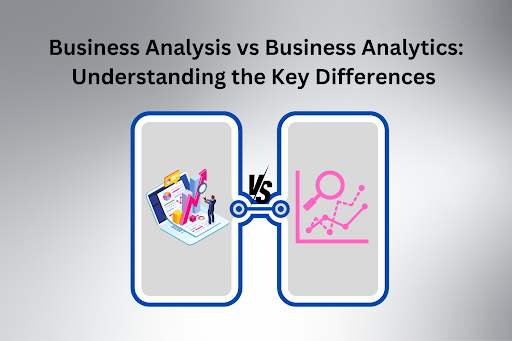Although Business Analysis and Business Analytics are often used interchangeably, their fundamental concepts and ideas are different. Understanding these terms is crucial for professionals, and it helps them make intelligent organizational decisions.
Business Analysis focuses on business functions and processes, improving operations and processes within the organization. At the same time, Business Analytics concentrates on statistics and data to extract actionable insights.
If you are a business or analytics professional, this blog helps you learn more about these concepts. Joining a Business Analysis Certification is also a considerable option to become an expert in this domain and carry out business operations efficiently. Let’s start the blog by understanding What is Business Analysis.
Table of Contents
- What is Business Analysis?
- What is Business Analytics?
- Key Differences Between Business Analysis and Business Analytics
- What are the Skills Required for Business Analysis and Business Analytics?
- Conclusion
What is Business Analysis?
Business Analysis is analyzing an organization’s needs and identifying solutions to business problems and loopholes. It helps in:
- Understanding the current state of business.
- Recognizing necessary changes for future success.
- Ensuring effective and efficient resource utilization.
What is Business Analytics?
Business Analytics investigates past business performances using techniques, tools, and skills. It is necessary to:
- Focuses on data and statistical analyses for future performance insights.
- Gathers information for company leaders for critical business decisions.
- Deals with internal/external clients/stakeholders.
Key Differences Between Business Analysis and Business Analytics
Business Analysis and Business Analytics are often considered the same but differ in various aspects and elements. These terms serve distinctly different functions in an organization. To better understand these concepts, let’s discuss Business Analysis vs. Business Analytics: Understanding the Key Differences in the points mentioned below.
Purpose
Business analysis recognizes the need for and finds solutions to improve organizational functions and processes. In contrast, business analytics uses past data to gain insights, forecast future trends, and suggest strategic decision-making.
Techniques and Tools
Business Analysis works on SWOT analysis, business process modeling, and requirements elicitation, while Business Analytics uses data analysis, statistical models, and other quantitative methods.
Data Usage
The data in Business Analysis is specific to the organization’s operations, stakeholders, and industry. It involves gathering data from customer feedback, market research, and internal processes. In contrast, Business Analytics relies on structured and unstructured customer data, market trends, social media, and industry benchmarks.
Outputs
Business Analysis identifies actionable solutions that align with the business’s strategic targets and improve processes. At the same time, Business Analytics generates insight and predicts patterns to facilitate data decision-making for the organization.
What are the Skills Required for Business Analysis and Business Analytics?
The skills required for Business Analysis and Business Analytics are entirely different. You need to have some skills to excel in these fields. A few of the skills required for these domains are listed below:
Skills for Business Analysis
Essential skills: Communication, management, research, and problem-solving skills are required.
Technical: Knowledge of software development and IT skills are essential.
Domain: Initiation, documentation, comprehension, and creativity skills are needed.
Skills for Business Analytics
Statistics: Statistics and data knowledge is necessary in this domain
Programming: Proficiency in mathematics and programming is a must.
Presentation: Presentations of outcomes in charts, pictures, and graphs provide good visualization.
Conclusion
In the business industry, professionals need to understand the difference between business analysis and business analytics. Business Analysis concerns functions, techniques, and processes, while Business Analytics covers data and reporting. Despite the difference, both are required to achieve a business’s outcomes.
